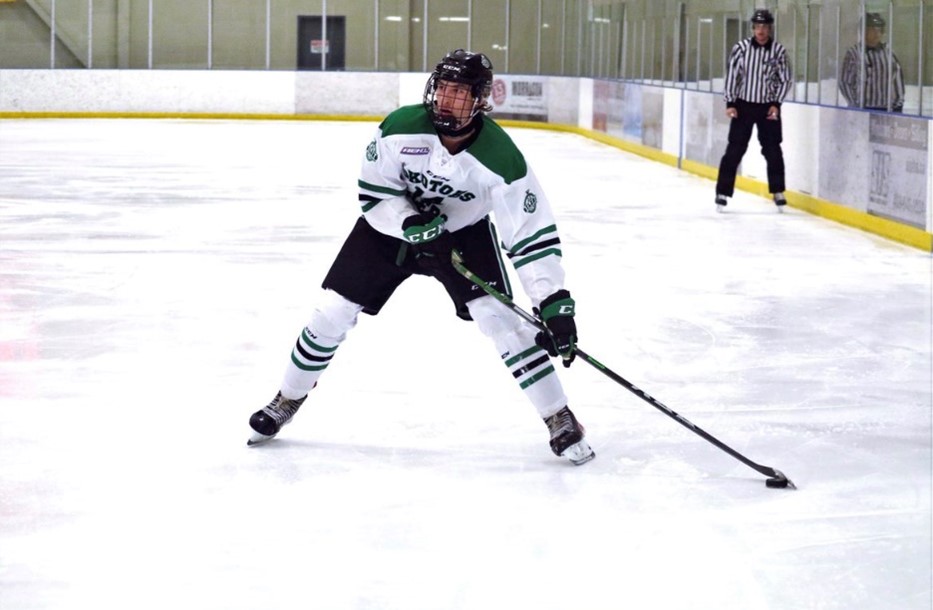On October 16th, Nash, a AAA (U17) hockey player took a nasty crosscheck to the head and jaw, causing him to fall sideways, hitting his helmeted head on the ice. Spotting what had happened, the team trainer assessed him on the bench and erring on the side of caution, pulled him from play as she thought he may have sustained a concussion. Shortly after the game, Nash’s mom emailed us to see if he could be evaluated ASAP, as he was experiencing headaches and jaw pain. Fortunately, we had already conducted a pre-season concussion screening exam and knew this athlete’s baseline status.
On day 2 (October 17), Nash was given a partial work up by one of our docs as he was fatigue and not feeling well. He had a headache (6/10 pain scale), neck pain (9/10), pressure in his head, fatigue, along with light and sound sensitivity. Also of importance, Nash had obvious visual (eye) tracking and vestibular problems, something we find on most concussion patients. A full spine (especially neck) treatment was given along with home care exercises – including eye retraining, icing, box breathing along with instructions on how to manage returning to school (the first step in recovery).
On day 3 (October 18), Nash was already showing signs of improvement and felt well enough to have a full concussion work up completed, which we were able to contrast with his pre-season evaluation. In addition to previous signs of concussion, his day 2 evaluation revealed the severity of his visual tracking deficits – he was unable to perform smooth tracking (smooth pursuits) rapid fixation (saccades), and convergence. In addition to his visual deficits, he had a significant decrease in balance and memory recall. Full spine treatment was again performed, and home care exercises included visual retraining along with light, non-impact cardiovascular exercise.
October 19th (day 4), we conducted a phone assessment with Nash, as he lives away from Strathmore. He reported he was able to go to school full days without worsening symptoms (first stage before return to sport) and do homework in 60 minute increments. All reported symptoms had improved, with some completely resolved! Overall, with treatment and homecare, he reported feeling 70% better. Due to Nash living away, we coordinated with the team’s athletic trainer to conduct exertional testing while aiding in supervising his return to the sport portion of his recovery. It was great to collaborate with an experienced trainer!
Nash was able to attend our clinic in person on day 6 (Friday) for a full treatment and re-evaluation. He demonstrated marked improvement with his neck pain and head aches almost being eliminated! Home care continued to include visual exercises.
Day 7 – 10 (Saturday though Tuesday) saw the next phase of recovery begin – return to play. As Nash was nearly symptom free, he began increasing his cardiovascular output, while doing hockey specific skills work with the team trainer. Although not always the case, this young man was able to perform these skills without any return of symptoms!!
Day 11 (Wednesday October 26th). Nash attended the clinic for a complete evaluation and full spine treatment. Subjectively he reported no symptoms, but more excitingly, his visual testing, balance and memory testing had all returned to pre-season levels! Although he was symptom free, it is still important to follow the step by step return to play program, so he was cleared for a non-contact practice later that day.
The athlete was cleared to fully return to play on October 29th, 1 day shy of two weeks post injury, which is quite remarkable considering the symptoms he first presented with! His recovery is undoubtedly linked with early intervention – the most recent thinking on concussion seems to suggest shorter recovery is linked with early care rather than the number or severity of symptoms.
Nash and his mother were a pleasure to work with and his mom sent us this note as a token of their appreciation: “I truly appreciate the care you provided Nash. You didn’t have to be available weekends, evenings, make calls to the trainer, open up availability in your schedule, contact doctors, etc. You chose to, and for that we are grateful. It was a quick recovery, but without the care you provided, that doesn’t happen. THANKYOU!”
Both Dr. Heather and Dr. Jason have taken post graduate training in concussion management. Although concussion cases can be difficult to manage, we truly enjoy walking patients through the journey from injury to recovery.

